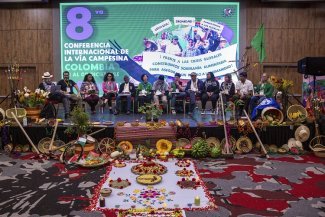Organisers and human rights activists are quite happy with the outcomes of the Baltic Pride 2013 demonstration, a major event promoting LGBT rights, in Vilnius on 27 July.
Lithuania is in the European spotlight, as it holds the EU’s rotating presidency since the beginning of July.
Hateful online comments and a few eggs thrown at the first lines of demonstrators did not disrupt the demonstration.
Baltic Pride is held in a different Baltic capital each year.
In 2010 activists won a difficult legal battle and courts obliged the authorities to provide the necessary security measures to protect a few hundred demonstrators from an angry crowd.
Solidarity across borders
Aliona Polujanova, volunteer and fundraising coordinator at the Lithuanian Gay League, sees remarkable progress – both since 2010 in Vilnius and 2012 in Riga, where demonstrators had to be fenced off from the crowd.
This year, the police was enough to ensure their safety.
However, she regrets that legal hurdles made preparations stressful for activists and unattractive to potential commercial partners.
The municipality initially claimed that adequate safety could not be ensured on Vilnius’ main street, until the highest court obliged it to gather enough police and allow the demonstration to proceed as planned.
“After the event, we will continue monitoring homophobic legislative projects and educating society,” says Birutė Sabatauskaitė from the Lithuanian Centre for Human Rights, which organises a human-rights-themed festival “Inconvenient films.”
This year the festival, along with a number of workshops, discussions and exhibitions, was a part of the week devoted to LGBT rights, which preceded the demonstration on Saturday.
The Centre is a member of the Human Rights Coalition, an umbrella for different institutions, including the Human Rights Monitoring Institute, and minority associations, such as the Lithuanian Gay League, the Lithuanian Jewish Community and the Roma Society Center.
Did such diverse organisations agree about the approach taken at Baltic Pride?
According to Ms Sabatauskaitė, “Hate is directed towards many groups. The members understand that those who hate a group of people for the colour of their skin will usually hate or despise another group for their sexual orientation.”
The political divide
Meanwhile, politicians remain divided over LGBT rights in the country where the constitution excludes the possibility of same-sex marriage and legislation on civil partnership is still absent.
The only openly gay MP, Rokas Žilinskas, (a conservative) wrote an op-ed on the most popular news site Delfi, claiming that instead of parading for their rights, homosexuals should focus on their individual battles.
His colleague Petras Gražulis (a populist from “Order and justice” party) was among the 28 people detained by the police for trying to aggressively disrupt the demonstration.
Mr Gražulis also used the parliament’s resources and website to speak out against “the promotion of homosexuality,” and his call was co-signed by the deputy mayor of Kaunas, the second-largest city, and a prominent Catholic cleric.
Aloyzas Sakalas, former socialist member of the European Parliament, wrote an op-ed where he claimed he “hadn’t heard” of discrimination against homosexuals and that lesbians and gays could “cooperate” if they wanted to have children.
The President, Dalia Grybauskaitė and Prime Minister, Algirdas Butkevičius remained ambiguous, whereas the Minister of Foreign Affairs, Linas Linkevičius expressed his support.
The mayor of Vilnius, Artūras Zuokas, who became internationally famous after faking a tank stunt against an illegally parked car, said his city “did not need” such demonstrations.
With their incremental success, activists reject the buzzword “young democracy,” used in Lithuania and abroad to explain the human rights situation.
The 20-year campaign for LGBT rights (homosexuality was decriminalised in newly independent Lithuania in 1993) shows that changes require the commitment of activists, not just time and generational change.









